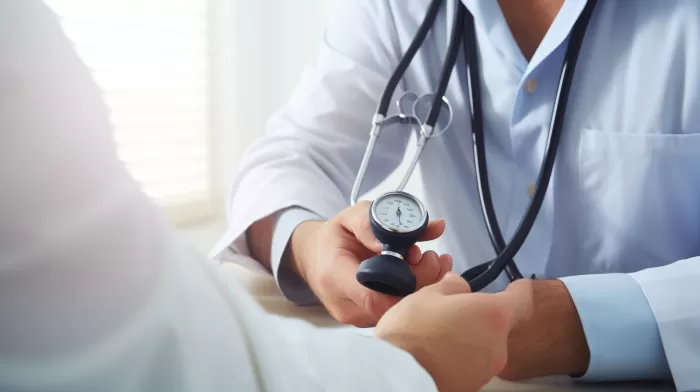It’s no secret that high blood pressure can be a silent killer. The symptoms may not be visible, and many people live with the dangerous condition without even realizing it. But did you know that even if you regularly visit a doctor and get a physical exam, your high blood pressure might be undiagnosed, especially if you’re under 25 years old?
A study conducted by the University of Wisconsin School of Medicine and Public Health showed that young adults aged 18-24 with high blood pressure were 28% less likely to be diagnosed with hypertension during doctor visits than their older counterparts. Despite having their blood pressure recorded, these younger patients often did not receive an official diagnosis.
The researchers looked into the electronic health records of 13,593 men and women who were at least 18 years old. All of these individuals had visited their doctor at least twice within the previous three years in an outpatient, non-urgent care setting and had multiple elevated blood pressures that met the guidelines for a hypertension diagnosis.
However, the findings showed that after four years of visiting their doctors and considering various other factors:
- 67% of 18- to 24-year-olds remained undiagnosed compared to 54% of people aged 60 and older
- 65% of 25- to 31-year-olds were undiagnosed
- 59% of 32- to 39-year-olds were still living with undiagnosed high blood pressure
These statistics are alarming, considering the detrimental impact that high blood pressure can have on an individual’s health. If left untreated, high blood pressure can lead to various health complications like heart disease, stroke, and kidney problems.
Dr. Heather Johnson, the lead researcher of the study, noted that young adults were less likely to be diagnosed if they smoked and if their hypertension was mild. On the other hand, factors that increased the likelihood of a diagnosis included being a minority, having diabetes, having severe high blood pressure, and making more clinic visits to primary and specialty care providers.
So, what can you do to ensure your high blood pressure doesn’t go unnoticed? Here are some tips:
- Be proactive about monitoring your blood pressure: Take charge of your health by regularly checking your blood pressure at home using a monitoring device like a digital sphygmomanometer. Keep a log of your readings and share it with your healthcare provider.
-
Know your risk factors: Genetics, age, and ethnicity can all play a role in hypertension. If you have a family history of high blood pressure or belong to a high-risk ethnic group, be sure to share this information with your doctor during your visits.
-
Adopt a healthy lifestyle: One of the most effective ways to prevent or control high blood pressure is through a balanced diet, regular exercise, avoiding smoking, and managing stress. According to the American Heart Association, maintaining a healthy weight, limiting salt intake, and eating a diet rich in fruits, vegetables, whole grains, and lean protein can significantly lower your blood pressure.
-
Don’t miss your appointments: Regular check-ups with your healthcare provider are crucial for the early detection and treatment of hypertension. Don’t skip these visits, even if you feel well.
-
Communicate with your healthcare provider: Be open and vocal about your concerns regarding high blood pressure. Ask your doctor for any clarifications you need and discuss any symptoms you may have been experiencing. This will help your doctor make a more informed decision about whether to test and diagnose you for hypertension.
-
Seek a second opinion: If you’re still unsure about your high blood pressure diagnosis, consider seeking a second opinion from another healthcare provider. This can help you feel more confident in the accuracy of your diagnosis and reassure you that you’re getting the appropriate care.
Remember, if you’re concerned about high blood pressure, it’s essential to be proactive about your health. By working closely with your healthcare provider and following these tips, you can better manage this serious condition and improve your overall health.



